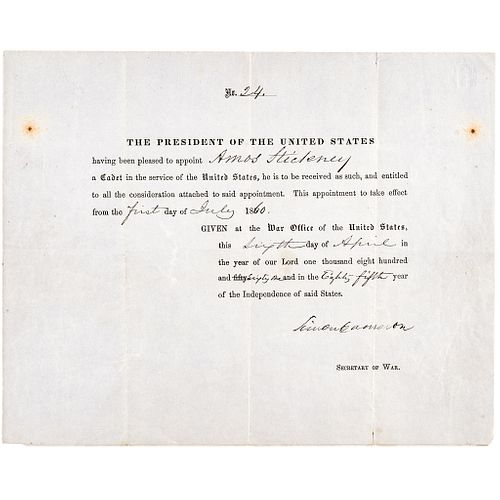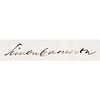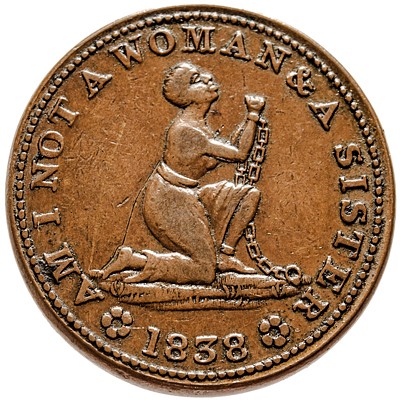April 6, 1861 SIMON CAMERON Secretary of War Signed 6 Days Prior to Civil War!
Lot 96
Categories
Estimate:
$800 - $1,000
Absentee vs Live bid
Two ways to bid:
- Leave a max absentee bid and the platform will bid on your behalf up to your maximum bid during the live auction.
- Bid live during the auction and your bids will be submitted real-time to the auctioneer.
Bid Increments
| Price | Bid Increment |
|---|---|
| $0 | $10 |
| $200 | $20 |
| $300 | $25 |
| $500 | $50 |
| $1,000 | $100 |
| $2,000 | $200 |
| $3,000 | $250 |
| $5,000 | $500 |
| $10,000 | $1,000 |
| $20,000 | $2,000 |
| $30,000 | $2,500 |
| $50,000 | $5,000 |
| $100,000 | $10,000 |
| $200,000 | $20,000 |
| $300,000 | $25,000 |
| $500,000 | $50,000 |
About Auction
By Early American History Auctions
Feb 27, 2021
Set Reminder
2021-02-27 12:00:00
2021-02-27 12:00:00
America/New_York
Bidsquare
Bidsquare : Black History & Slavery, Historic Autographs, Colonial America & Weapons
https://www.bidsquare.com/auctions/early-american-history-auctions/black-history-slavery-historic-autographs-colonial-america-weapons-6434
318 Lots of Rare, Historic Autographs, Americana, Civil War Era, George Washington, Abraham Lincoln, Slavery & Black History, Revolutionary War Era, Colonial America, Federal Period, War of 1812, Colonial Currency, Historic Early American Guns & more... Early American History Auctions auctions@earlyamerican.com
318 Lots of Rare, Historic Autographs, Americana, Civil War Era, George Washington, Abraham Lincoln, Slavery & Black History, Revolutionary War Era, Colonial America, Federal Period, War of 1812, Colonial Currency, Historic Early American Guns & more... Early American History Auctions auctions@earlyamerican.com
- Lot Description
Autographs
"Simon Cameron" as Lincoln's Secretary of War Early Civil War Signed 6 Days Prior to the official start of the Civil War
SIMON CAMERON (1799-1889). Served as United States Secretary of War under President Abraham Lincoln at the start of the Civil War.
Partly-Printed Document Signed, "Simon Cameron" as United States Secretary of War, measuring 7.75" x 9.75," 1 page (unfolds to 9.75" x 15.5"), War Office, Very Fine. President Lincoln met with Simon Cameron twice after his arrival in Washington, and finally appointed him to his Cabinet on March 5, 1861, the very day after the Inauguration. This rare early Signed Document is April 6, 1861-Dated, being just 6 Days prior to the official start of the Civil War. Appoints "Amos Stickney a Cadet in the service of the United States...". During the Civil War, Stickney served on General Oliver O. Howard's staff during the March to the Seas, and the Carolina campaign. This simple black printed form is so early in the Lincoln administration it appears straightforward and less elaborate than most. It bears a strong dark signature "Simon Cameron", with bold printing and no problems save for two trivial rust spots far out in the blank margin area. Worthy of a significant premium as being such an early historic document for appointment of a military cadet, likely to West Point, just 6 days prior to the official start of the American Civil War!
Lieutenant Colonel Amos Stickney, Born Missouri. Graduate USMA 1864. During the Civil War, Stickney served on General Oliver O. Howard's staff during the March to the Seas and the Carolina campaign.
His post-war services were largely connected with fortifications and river and harbor improvements. He helped to build the original canal on the Mississippi River at Keokuk, IA, including the design of all machinery. Prior to his appointment as Mississippi River Commission (MRC) President, he served as the Fourth MRC District Engineer and as a Member of the Commission from 1894-1901. In these capacities he was heavily involved with formulating the Commission's early plans for treating the Atchafalaya River. Stickney also was appointed President of the Missouri River Commission in 1896.
"The Great Winnebago Chief" and "Czar of Pennsylvania," Simon Cameron was the Pennsylvania Republican leader who served in the Senate (1845-49, 1857-61, 1867-77), and replaced James Buchanan.
Historian Doris Kearns Goodwin wrote: "Determined to protect his position, Cameron sought to ingratiate himself with the increasingly powerful radical Republicans in Congress, led by Massachusetts' Charles Sumner, Ohio's Ben Wade, Indiana's George Julian, and Maine's William Fessenden. Though known as a conservative on the issue of slavery, Cameron began by degrees to embrace the radical's contention that the central purpose of the war was to bring the institution of human bondage to an end."
Among the controversies in which Cameron engaged was his annual report in December 1861 which stated: "Those who make war against the Government justly forfeit all rights of property, privilege and security derived from the Constitution and laws against which they are in armed rebellion; and as the labor and service of their slaves constitute the chief property of the rebels, such property should share the common fate of war to which they have devoted the property of loyal citizens. It is as clearly the right of the Government to arm slaves when it may become necessary as it is to use gunpowder or guns taken from the enemy." President Lincoln rejected this premature emancipation proclamation (which had been written by Edwin M. Stanton) and ordered copies of it recalled.
Cameron served until removal in January 1862 for mismanagement, corruption and abuse of patronage as well as unauthorized endorsement of Emancipation.
Cameron blamed his ejection from the Cabinet in part on General John C. Frmont, who had been dismissed from his western command a few months earlier: "It was necessary for somebody to go out and attend to Fremont. [Montgomery] Blair went first and came back and equivocated. Then they all said I must go. I told Lincoln, I understand this - Fremont has got to be turned out, and somebody will have to bear the odium of it - if I go and do it I will probably lose my place here. In that case you must give me a foreign mission. That was the beginning of the Russian Mission."
Our Auction Contents:
Black History & Slavery: (Lots 1 - 63)
Abraham Lincoln Related: (Lots 64 - 74)
Historic Autographs: (Lots 75 - 235)
Colonial America: (Lots 236 - 261)
Revolutionary War: (Lots 262 - 304)
George Washington Related: (Lots 305 - 306)
Early American Guns & Weapons: (Lots 307 - 318) - Shipping Info
-
Early American provides in-house worldwide shipping. Please contact us directly if you have questions about your specific shipping requirements.
-
- Buyer's Premium



 EUR
EUR CAD
CAD AUD
AUD GBP
GBP MXN
MXN HKD
HKD CNY
CNY MYR
MYR SEK
SEK SGD
SGD CHF
CHF THB
THB













